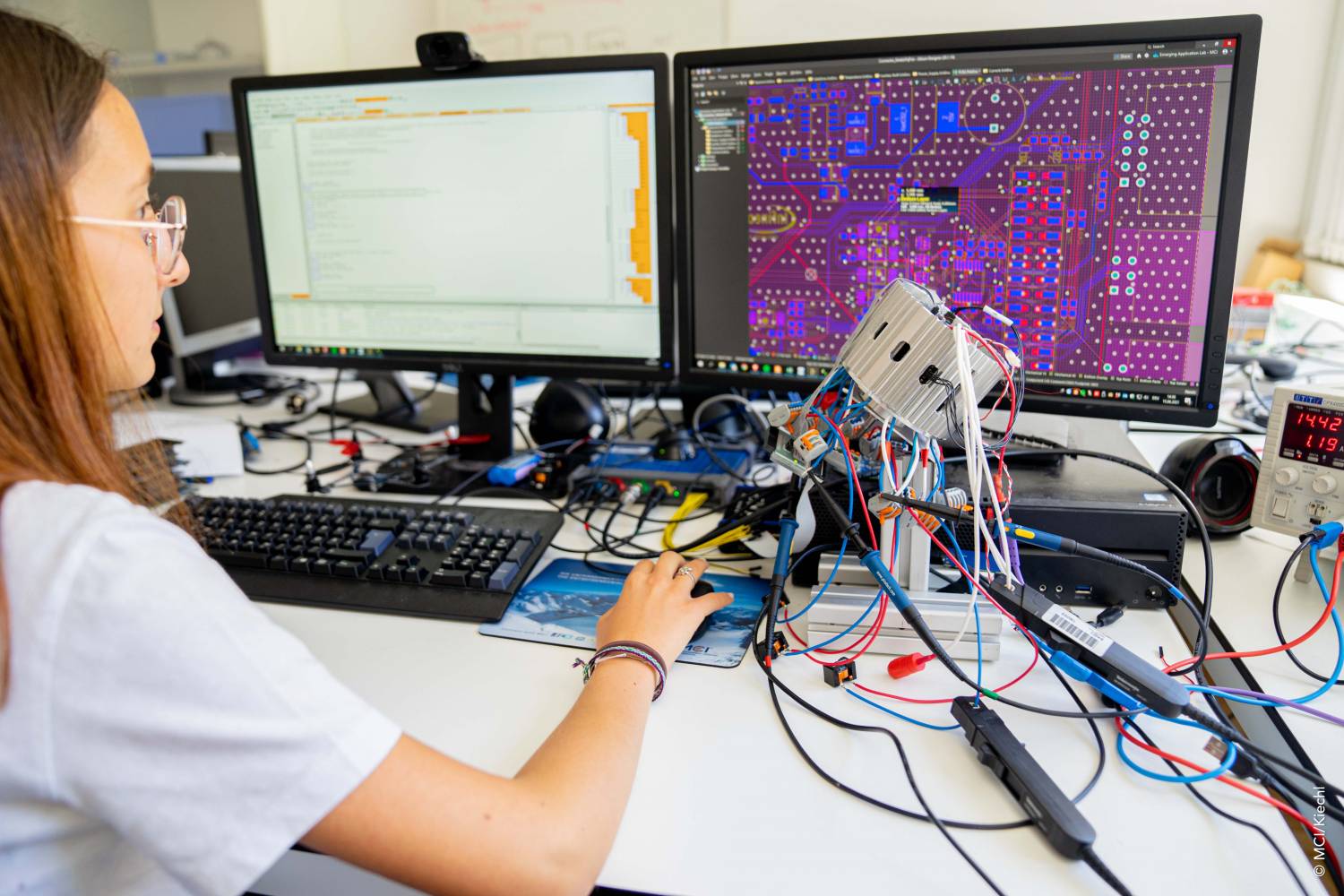The Emerging Applications Lab at MCI | The Entrepreneurial University® is to receive funding from Infineon for another two years. Infineon has agreed to invest EUR 400,000 annually. The experts working at the innovation lab use the latest Infineon chip solutions to develop system demonstrators for the global market. The latest development is a CO2 sensor for air quality measurement.
Infineon and the MCI (Management Center Innsbruck) established the Emerging Applications Lab in 2016. Infineon Austria and its German parent company have now decided to extend the cooperation agreement for another two years and to invest an additional EUR 800,000.
The innovation lab currently employs eight experts who follow Infineon’s “from product to system” approach and combine hardware and software to design reference systems. Their work helps to reduce development times on the customer side and bring applications to market maturity more quickly. Over 20 system demonstrators have been realized in the lab to date and presented worldwide. The lab is also a very valuable location for MCI students, because it is open for them to work on the practical side of their applied research and on technical developments.
Innovation incubator for industry and research
Sabine Herlitschka, CEO Infineon Austria: “Infineon and MCI have created a veritable innovation incubator in the Emerging Applications Lab. Scientific expertise is matched with the market requirements of industry here in a professional manner to translate new system solutions into applications more quickly. It is an active contribution to practice-oriented education and to training more technical professionals for pioneering innovations.”
MCI recently celebrated its 25th anniversary, and for Rector Andreas Altmann the intensification of cooperation is pointing the way into the future: "The Innovation Lab is a magnet for technical talent. More than 120 scientific papers have been written since the lab was established in 2016, all of them dealing with the latest developments in the technology sector. This close cooperation between science and practice brings a significant competitive edge for Austria as a business location and generates excellent career opportunities for our alumni.”
CO2 sensor system measures air quality
The most recent development is a CO2 sensor pilot system for measuring and visualizing indoor air quality. The sensor sends a warning signal when the air quality drops and provides the necessary fresh air supply, which is crucial for people's well-being and productivity. An additional benefit of the sensor comes to bear in the COVID-19 pandemic: as the concentration of aerosols through which the virus is transmitted correlates with the concentration of CO2, the CO2 sensor can help make indoor meetings safe – whether these are for people in offices, in schools or at home.
The system is based on the Infineon XENSIV PAS technology that stands out with its measurement principle, long-term stability, accuracy and small size. The sensor is up to 75 percent smaller than conventional CO2 sensors in the market. The CO2 sensor is already in use at the Infineon Campeon in Munich, and in future, it will also be installed in the lecture halls of the MCI so that the facility managers always have air quality under control and can manage indoor air in an optimum manner.
Ronald Stärz, head of the Emerging Application Lab in Innsbruck: “The CO2 sensor is a typical example, where both the benefit and the high demand for smart solutions was clear to us as developers and users. This is why we are already working to develop the next platform generation for additional applications together with Infineon.”
Wearables and cobots in the innovation pipeline
The focus for the coming years will be on highly promising areas of application, including the development of powerful and small electric drives, e.g. for collaborative robotic systems, or “cobots”. They cooperate interactively with humans and can be employed as service robots in industry, but also in logistics, in disaster management or medical care.
CO2 sensor system measures air quality
The most recent development is a CO2 sensor pilot system for measuring and visualizing indoor air quality. The sensor sends a warning signal when the air quality drops and provides the necessary fresh air supply, which is crucial for people's well-being and productivity. An additional benefit of the sensor comes to bear in the COVID-19 pandemic: as the concentration of aerosols through which the virus is transmitted correlates with the concentration of CO2, the CO2 sensor can help make indoor meetings safe – whether these are for people in offices, in schools or at home.
The system is based on the Infineon XENSIV PAS technology that stands out with its measurement principle, long-term stability, accuracy and small size. The sensor is up to 75 percent smaller than conventional CO2 sensors in the market. The CO2 sensor is already in use at the Infineon Campeon in Munich, and in future, it will also be installed in the lecture halls of the MCI so that the facility managers always have air quality under control and can manage indoor air in an optimum manner.
Ronald Stärz, head of the Emerging Application Lab in Innsbruck: “The CO2 sensor is a typical example, where both the benefit and the high demand for smart solutions was clear to us as developers and users. This is why we are already working to develop the next platform generation for additional applications together with Infineon.”
Wearables and cobots in the innovation pipeline
The focus for the coming years will be on highly promising areas of application, including the development of powerful and small electric drives, e.g. for collaborative robotic systems, or “cobots”. They cooperate interactively with humans and can be employed as service robots in industry, but also in logistics, in disaster management or medical care.
Share article






